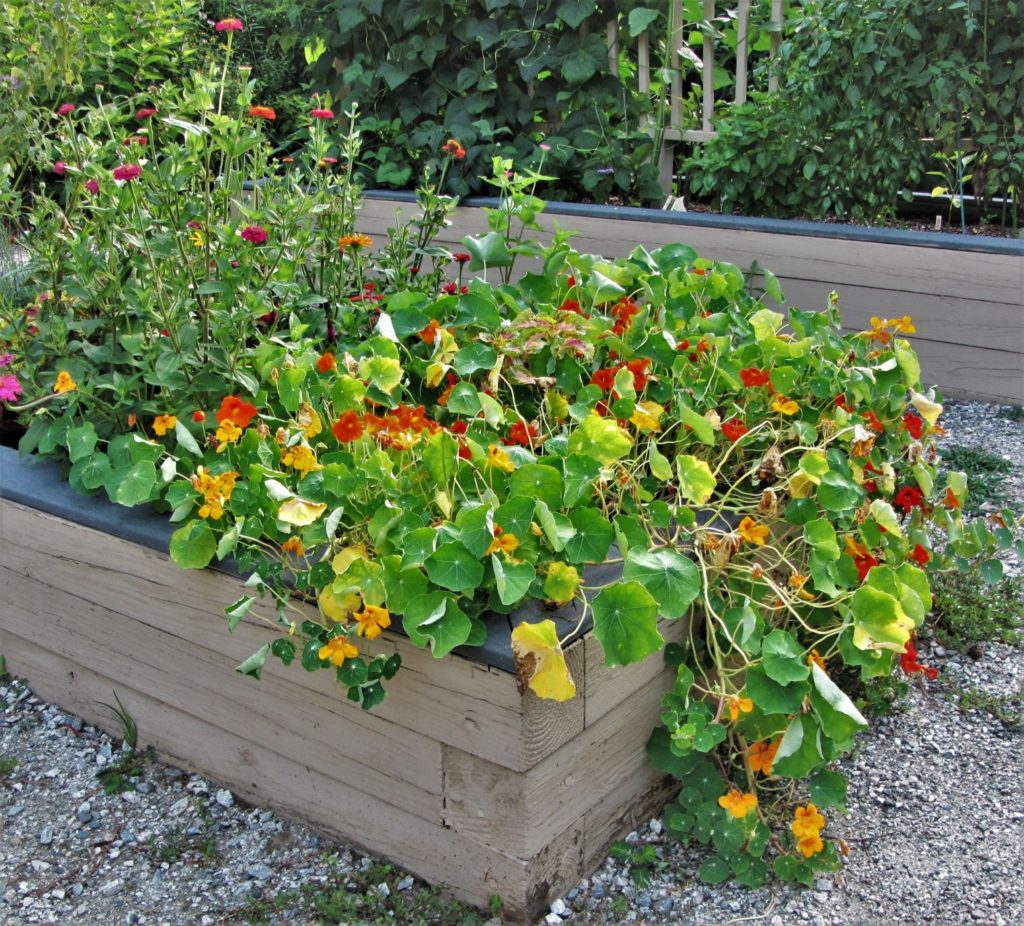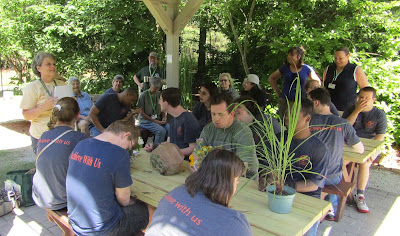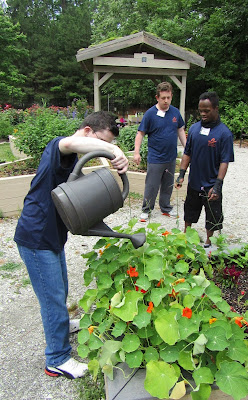Therapeutic Gardening in a Botanical Garden
A Special Needs Gardening Program!
A collaboration between our Master Gardeners and Arc, the Arc of Abilities Day Support Program is for adults with special needs. The program teaches participants how to grow and use flowers, vegetables, and herbs that they cultivate in four large, raised beds year-round in the Williamsburg Botanical Garden’s Therapeutic Garden, and on rainy days in the Park’s Visitor’s Center.
In a partnership that has lasted for more than five years, Master Gardeners meet with Arc clients and staff once every two weeks, April through June, and again in September through October. The group visits the garden to harvest flowers, herbs, and vegetables on a regular basis, even in months when no session is planned. Master Gardeners maintain and water the beds throughout the summer, and help participants plant winter crops, violets, and spring flowers that grow from autumn through early spring.
Project leaders Karen Brooks, Diana Tiller-Dichtel, and Barbara Floyd develop a lesson plan, which they coordinate with other project members, a week or more before each session. They ask for help with specific tasks and for commitments to bring something of interest to share. Once the lesson plan is completed, they work with the Arc staff so they can explain to the group what they will be doing ahead of their class in the garden.
So Many Things to Do!
The Arc group arrives for each session with smiles, very enthusiastic to participate in the day’s plans. When it rains, and the group cannot go to the garden, everyone meets at the Park’s Interpretive Center instead. Activities are adapted, and games like Veggie Bingo come out. The group can also make a craft, and they learn from what the Master Gardeners have brought to share before enjoying refreshments. If the weather clears, everyone walks across to the garden to check on the plants and harvest.
During sessions in the Garden, the group likes to plant seeds along with plants and they enjoy learning about them. But their favorite thing is to harvest flowers, herbs, and vegetables from the garden. After the session, they always take items back to their classroom and cook something with them. This group LOVES to eat, and they are willing to try any herb or vegetable we plant. They also harvest fresh flowers, in season, for their classroom and to share as gifts. The Master Gardeners teach about herbs and vegetables, companion planting, pollinators, and good and bad bugs while sharing their love for gardening.
The group often visits other areas of the botanical garden to see what is growing, and to enjoy “Five Senses” scavenger hunts. This is always a lot of fun for everyone. They complete garden-related crafts and sometimes enjoy a snack related to gardening activities. Often herbs discussed that day will be featured in the snack. Master Gardeners take notes and photos during each session, to produce a summary of the day’s activities which is shared with everyone. 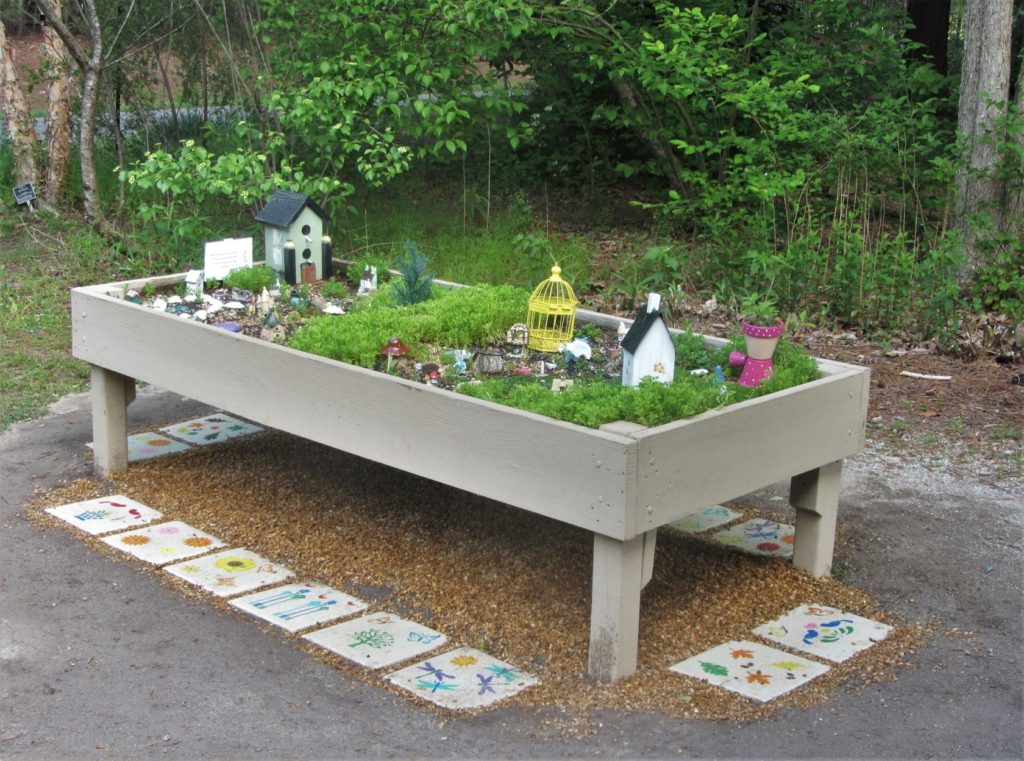
The Fairy Garden
One of the raised beds was converted into a ‘Fairy Garden’ in 2019. A variety of succulents grow in this space designed as a small village for fairies. There are many features, including houses, pools, roads, and other interesting features. The group often crafts items to add to the garden, including the colorful tiles which surround it. The Fairy Garden has become a favorite attraction for children who visit the garden with their parents.
Seasonal Planting
In the spring, the group discusses and plants early crops such as spinach, radishes, carrots, and herbs. Participants also grew spinach and lettuce outside of their classroom, and were able to make a Basil – Honey vinaigrette for their salad, which they loved! New recipes are shared at each session, featuring produce harvested that day, for all participants to try.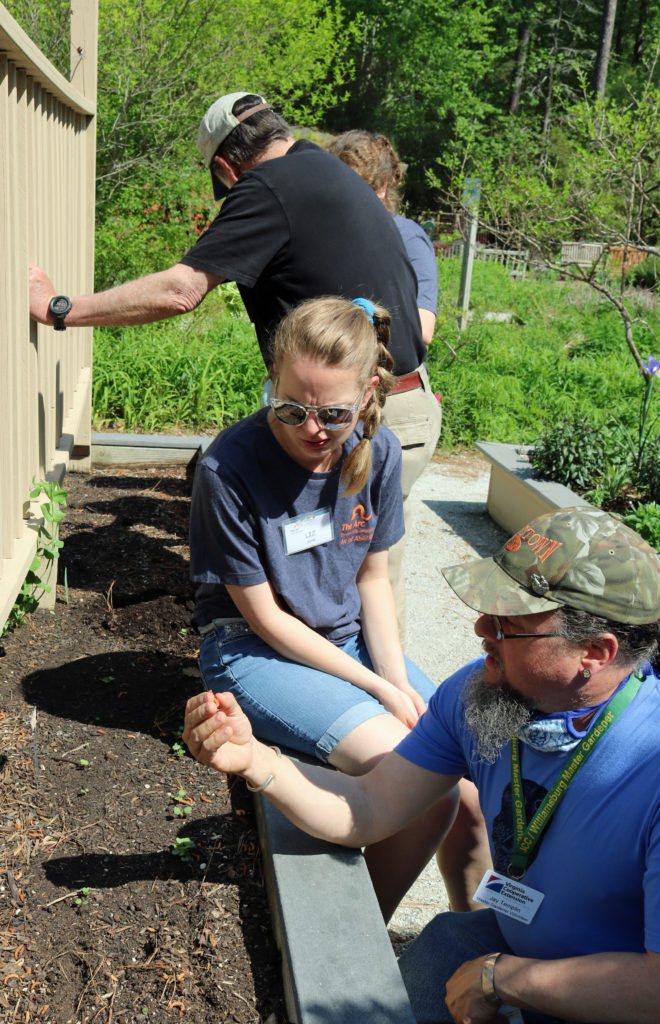
Another favorite item planted in the raised beds every year is potatoes, which are ready to be harvested at the last session in June. This year, the group could not decide whether to make potato salad or French fries with their harvest. They had enough to make both!
This summer, the Arc gardeners are growing sweet potatoes, cherry tomatoes, peppers, two kinds of green beans, and okra. At first, the group frowned on okra, but the Master Gardeners told them the plant had a really pretty flower! One of the group members remembered that her Nan had made fried okra. She told the group, “Remember, we all loved it!”
They also grow several basil plants in the raised bed, because this group LOVES pesto. They plan to make another batch soon, as the basil plants are huge. After the group enjoyed zucchini bread one summer, they loved it, and they have made it since. They also ask project leader Karen Brooks to make it for them, because her Zucchini bread is particularly delicious!
Grow Your Own Pizza!
Earlier this summer, the Master Gardeners made up a “Pizza Pot” for the Arc group to take to their classroom to watch it grow, and later harvest for their cooking. The pot had oregano, basil, and a “Chocolate Sprinkles” cherry tomato in it. They loved this idea because they knew when the plants produced they would get to add all the herbs and tomatoes to pizzas they would make for lunch.
They watched their pot carefully and planned to harvest when they knew they had enough tomatoes to make their pizzas. The next day when they arrived at their center, Mr. Squirrel was making off with their tomatoes! They only had four left! They went ahead with making pizzas but had to add some other, purchased tomatoes to have enough for everyone.
This is a favorite project for Master Gardeners interested in Therapeutic Gardening. It allows for close, collaborative involvement with an important community group. Participants express their joy, interest, and appreciation each time the group meets. It is possible to cover a lot of interesting garden topics with this group and they always leave with smiles on their faces and can’t wait to return! We hope to continue this program for years.
Karen Brooks (knbrooks1@verizon.net) is a JCCW Master Gardener and a dedicated leader of Therapeutic Gardening programs in her unit. She provided most of these photos. 